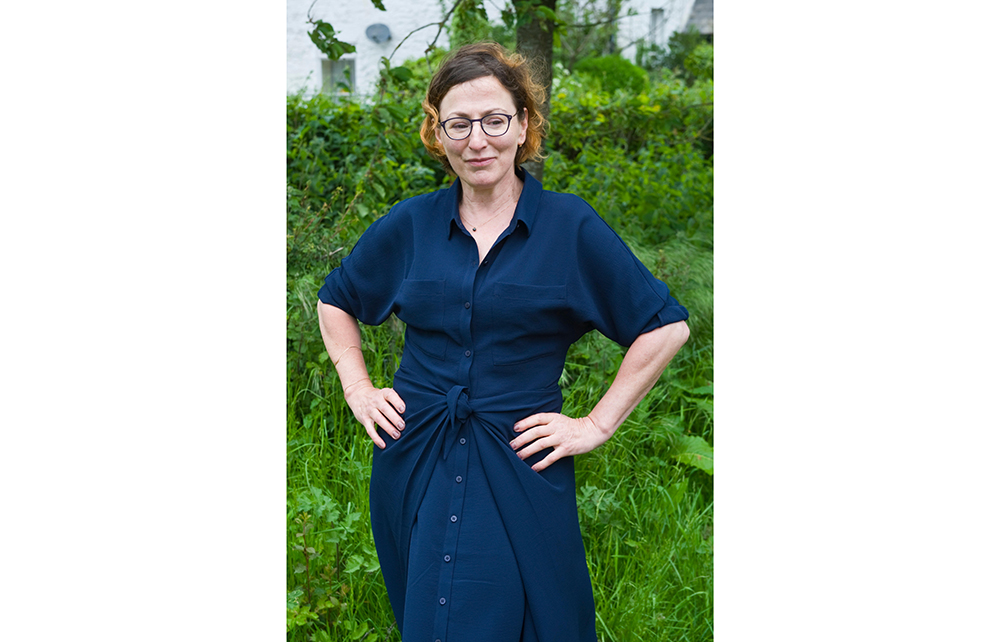Nina Stibbe is back in London. It has been 20 years since she left, and 40 years since she first arrived from Leicester to nanny, ineptly, for Mary-Kay Wilmers, the editor of the London Review of Books.
Back then, she chronicled her adventures (minor car crashes; thinking Alan Bennett was in Coronation Street; inadvertently stealing Jonathan Miller’s saw) in deadpan letters to her sister Vic that became the delicious Love, Nina. This time she’s resolved to keep a diary of her year as ‘Debby’ Moggach’s lodger in a narrow Kentish Town terrace with an over-watered garden she already disapproves of. ‘I’ll write it Alan Bennett-style,’ she says in a gleeful bit of Bennett-baiting (he was notoriously thin-lipped about his appearances in Love, Nina), then dissects the form, imagining him writing about tea with Ian McEwan: ‘Details of tea… add a quaint thing McEwan said… then round off with something mischievous or banal involving a royal or a writer from the 1950s.’
It’s Love, Nina 2, with Sathnam Sanghera’s loofah replacing Miller’s saw. Heaven, basically. But things are different now. Stibbe is 60, beset with ‘back pain and sadness’. The menopause has done a number on her body and mind and, crucially, this year in London is a ‘sabbatical’ from her marriage, ‘possibly forever (it couldn’t be denied)’. Splitting up is miserable and her life feels like a novel ‘written in a hurry’ by one of Anne Tyler’s younger cousins, she says. ‘Anne has given it a light edit, but there are still clunky parts and much that is completely implausible.’ North London has changed, too – overwhelmingly weed-scented and full of rubbish and chicken bones her poodle-cross Peggy nearly chokes on. No wonder she keeps saying ‘Oh God, oh God, oh God’ to herself.
This might not be the cheeriest prospect for readers looking to escape their own malaises with this most reliably entertaining of comic writers. There’s another hitch. Much of the joy of Love, Nina was Stibbe’s underwhelmed outsider’s take on literary London, always vaguely offending prominent Shakespeareans and Islington intellectuals and more interested in stew ingredients and the merits of a side ponytail than their dramas. But after six books and several literary prizes, she’s absolutely part of that world now. The diary chronicles a succession of literary festivals, book tours and launches. When she’s not dining with Nick Hornby or Elizabeth Strout, she’s gossiping with Andrew O’Hagan, attending Dolly Alderton’s birthday party or getting mistaken for Succession writer Georgia Pritchett’s wife by Philippa Perry. It sounds a welcome respite from separation sadness; but is it fun for the reader, nose pressed up against the window of the Wolseley?

It is – hugely so – because she’s still Nina. Stibbe is indiscriminately delighted by people, famous or not. She relishes their foibles and the flotsam that annoys or preoccupies them, and she’s not going to stop just because some are household names. She cares as little at 60 as she did at 20, happily criticising Francis Spufford’s hat, dodging Lionel Shriver, appraising Hornby’s cereal selection or getting caught taking a sneaky picture of Bennett (him again) on a bench.
As for Debby – who sounds like an absolute riot – her ill-kept compost bin, dishwasher recklessness, engorged garden hose and the time she’s spotted sharing a bench with friends ‘swigging from a bottle of Campo Viejo like a bunch of old winos’ all get the Stibbe treatment. Everyone does: if you’re a friend, or even acquaintance, she’s going to collect and gleefully retell your anecdotes with her beady eye for a gripping, funny ‘soup to nuts’ story.
Eternal gratitude to everyone game enough to let her include their vaginal prolapses and relationship crises (there are a handful of ‘[redacted]’s): it was absolutely worth it. As is only fair, she gives herself the same treatment. We get soup to nuts on her menopausal incontinence, including her son posting a picture of her buying her first pack of Tena Lady (‘liners, not pads’) on his close friends’ Instagram.
Regular appearances by her children, both studying in London, bring a bit of that carefree Love, Nina spirit too. The city is washed fresh for her through their eyes and adventures: Tinder dates, lousy internships and reckless scooter rides. They keep her optimistic, and she takes a touching and utterly accepting delight in their blossoming into young adulthood.
She delights in all the absurdities of life too – and that’s a true gift in bleak times, hers and everyone’s. The book rolls around joyfully in the bathetic found poetry of 2023: a ‘longline tankini’, a barrage of targeted ads for the Finsbury Apartment Pant, Snakebite vape, Vic’s Kia Sorento – a recurring character – or email pleas to review an ‘extra deep cool mattress topper’. ‘A tube of Bazuka nicked at Swiss Cottage’ is pure Victoria Wood. I can offer no greater compliment.
Stibbe might be sad and scared and have a bad back, but I’d rather read her sad than almost anyone else happy. You can’t stay down when you relish life this much, anyway: she’s going to be fine, you feel, by the end of the book. I can’t say as much for Deborah Moggach’s nasturtiums.






Comments